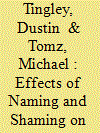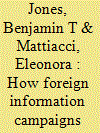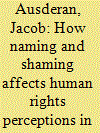|
|
|
Sort Order |
|
|
|
Items / Page
|
|
|
|
|
|
|
| Srl | Item |
| 1 |
ID:
186192


|
|
|
|
|
| Summary/Abstract |
How does naming and shaming affect public support for compliance with international agreements? We investigated this question by conducting survey experiments about the Paris Agreement, which relies on social pressure for enforcement. Our experiments, administered to national samples in the United States, produced three sets of findings. First, shaming by foreign countries shifted domestic public opinion in favor of compliance, increasing the political incentive to honor the Paris Agreement. Second, the effects of shaming varied with the behavior of the target. Shaming was more effective against partial compliers than against targets that took no action or honored their obligations completely. Moreover, even partial compliers managed to reduce the effects of shaming through the strategic use of counter-rhetoric. Third, identity moderated responses to shaming. Shaming by allies was not significantly more effective than shaming by non-allies, but Democrats were more receptive to shaming than Republicans. Overall, our experiments expose both the power and the limits of shaming as a strategy for enforcing the Paris Agreement. At the same time, they advance our understanding of the most significant environmental problem facing the planet.
|
|
|
|
|
|
|
|
|
|
|
|
|
|
|
|
| 2 |
ID:
167399


|
|
|
|
|
| Summary/Abstract |
This article conducts a comparative analysis of peer and public pressure in peer reviews among states. Arguing that such pressure is one increasingly important form of shaming in global politics, we seek to understand the extent to which five different peer reviews exert peer and public pressure and how possible variation among them can be explained. Our findings are based on responses to an original survey and semi-structured interviews among participants in the reviews. We find that peer and public pressure exist to different degrees in the peer reviews under study. Such differences cannot be explained by the policy area under review or the international organization in which peer reviews are organized. Likewise, the expertise of the actors involved in a peer review or perceptions of the legitimacy of peer review as a monitoring instrument do not explain the variation. Instead, we find that institutional factors and the acceptance of peer and public pressure among the participants in a peer review offer the best explanations.
|
|
|
|
|
|
|
|
|
|
|
|
|
|
|
|
| 3 |
ID:
192877


|
|
|
|
|
| Summary/Abstract |
Governments involved in civil wars often seek to shape foreign perceptions of the conflict and of the government’s role in the conflict. To this end, for example, many such governments have engaged in public diplomacy campaigns (PDCs) in the United States since the end of the Cold War. Specifically, these governments have hired US public relations (PR) and lobbying firms to present favorable narratives of themselves and their role in the conflict. Through PDCs, governments seek to shape US public pronouncements about the governments and the conflict itself. Are PDCs effective tools to reach this goal? We argue that the effect of PDCs is divergent. PDCs help mobilize both supporters and opponents of the sponsoring governments. In so doing, PDCs increase both positive and negative public statements from US officials toward the civil war government. We compile data on PDCs in the United States since the end of the Cold War. Our results have implications for research on foreign influence in foreign policy, combatants’ moral hazard, and international norms about combatant behavior. Moreover, in order to gauge the influence of foreign actors on domestic narratives of civil wars, it is crucial to consider how such foreign actors can indirectly shape the discourse around conflict by mobilizing domestic factions.
|
|
|
|
|
|
|
|
|
|
|
|
|
|
|
|
| 4 |
ID:
128858


|
|
|
|
|
| Publication |
2014.
|
| Summary/Abstract |
Although individual citizens perceive the human rights conditions in their country differently, existing research on human rights and public opinion has tended to ignore the possible impact from international sources of information. This article builds upon previous research on human rights, public opinion, and international organizations by arguing that citizens will perceive the human rights conditions in their country more negatively when their country is shamed by the international community for human rights violations. This hypothesis is tested using both observational and experimental methods. I use multilevel modeling and survey responses from both the Gallup International Millennium Survey and the World Values Survey to show that individual human rights perceptions are negatively related to the adoption of resolutions by the United Nations Commission on Human Rights shaming a survey respondent's government for human rights abuses, as well as the number of human rights-focused international nongovernmental organizations with members or volunteers living within the survey respondent's country. These results are supplemented by an original, web-based experiment on human rights perceptions in the United States and India in which survey respondents are exposed to an experimental manipulation modeled on press statements from Amnesty International shaming the survey respondent's country for human rights abuses.
|
|
|
|
|
|
|
|
|
|
|
|
|
|
|
|
| 5 |
ID:
113822


|
|
|
|
|
| Publication |
2012.
|
| Summary/Abstract |
Given the myriad of human rights abuses that occur globally and daily, why are some nations on the receiving end of a substantial amount of international opprobrium, while others receive far less attention and condemnation? The authors contend that the increasing presence of human rights organizations in such states is the critical link between the local and the international. Increases in the number of such groups contributes significantly to the generation of Amnesty International urgent actions, one of the most-often-utilized tools in naming and shaming campaigns against human rights abusing regimes. The authors find strong support for nearly all their hypotheses.
|
|
|
|
|
|
|
|
|
|
|
|
|
|
|
|
| 6 |
ID:
178123


|
|
|
|
|
| Summary/Abstract |
European non-governmental development organisations (NGDOs) have used naming and shaming extensively in their advocacy to push the EU and member state governments to implement international norms on foreign aid. The paper analyses the contents of NGDO advocacy publications, with the goal of gaining insight into how and why these organisations engage in naming and shaming. The exercise reveals that NGDOs are highly selective in the norms they promote through naming and shaming: they shame governments heavily for not implementing norms on aid quantity, but are less vocal on norms related to aid effectiveness. The paper shows that NGDOs strategically select norms in their naming shaming activities which have higher resonance with the public and are less costly to monitor, criteria which aid quantity norms fulfil. There is also some evidence that NGDOs promote increasing the quantity of aid because it would enhance their own access to donor funding.
|
|
|
|
|
|
|
|
|
|
|
|
|
|
|
|
|
|
|
|
|